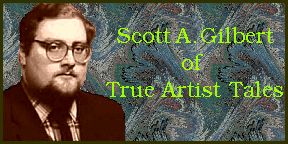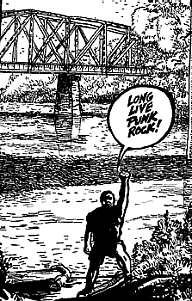

Scott Gilbert is, dare I say, a Houston institution whose daily strips have been appearing in local rags since I can remember. The reason Gilbert is so valued in this community is because he so perfectly captures everything about the bizzarre thing that is living in Houston. The following is a short e-mailed interview for your pleasure but if ya want to really vibe on Sir Gilbert check out his page at Scott Gilbert's True Artist Tales
WG: If you had chosen a different medium what would you be missing in your life? What do you get out of this.
SG: The 2 main passions of my life keep me in comics, because they are the basic components of comics: drawing and narrative (storytelling). I might easily have slid off into just painting or writing fiction, but the combination of the two in comics is perfect for me. Also, there are formal elements of comics which are fascinating to me, for example, an exercise of lyrical timing similar to that found in poetry (yet also linked to the maintenance and manipulation of tension in staged drama and comedy, and further linked to the visual activity of choreography in dance and acting). Comics (or comix or the graphic narrative, however you like to call them) is a unique artistic medium with unique intrinsic formal qualities, but it tends to combine and hybridize other mediums which are more traditional and more popularly accepted in our society. I just dig it, man!
WG: How do you feel about the state of comics today?
SG: When we talk about "comics", we're speaking of a lot of different things, depending on what our concerns are, and where we live. The traditional comic book industry in the United States is currently collapsing. The superhero genre, long the pathetic mainstay of the U.S. industry is incredibly inbred artistically and has fallen out of favor with the public who are buying fewer and fewer of these types of books. This is good news for non-genre, non-superhero, so-called "alternative" comics, which people are continuing to by at pretty much the same low levels they always have. A lot of people in the industry are out of work now, and the entire apparatus for distributing comics is in a state of panic and constriction. The entire industry needs and will see in the next few years, a total restructuring. Comics in the U.S. in general are losing favor with the broad public (and losing their buying dollars), due to the increasing popularity of electronic media, and to the changing reading habits and perceptions of narrative in our society in this post-MTV world. Comics as an art form in the U.S. are doing pretty well, thanks to a broad influx of dedicated and intelligent young talent (Tom Hart, Jon Lewis, Dan Clowes, the Hernandez Brothers, Chris Ware, Jessica Abel, etc.) who do not have any allegiance to the traditional super-hero mainstream. Unfortunately, the lack of income comics provide will tend to squeeze a lot of this young talent OUT of the medium over time.

In other countries, comics are in quite a different state, so to speak. In Japan comics are incredibly popular and are a vast, explosive industry. Japanese culture is so very different from ours, however, that I can't even compare the operations of the medium there with what I'm familiar with here. There's some good stuff being done over there, but from a completely alien perspective. In Europe (and Quebec in Canada), comics are doing GREAT as an art form, and as an industry. As with jazz, comics receive much greater and broader respect as an art form worthy of serious consideration by adults in Europe generally. Comics are packaged in elegant, beautifully designed hardcover editions and proudly sold by real bookstores rather than smarmy comic book fanboy shops (as they are here in the U.S.). Since comics in Europe receive a reasonable amount of respect and acceptance from their audience, it is possible for comix artists to make a good living off their work and to improve their work over time. As a result, European comics achieve levels of aesthetic, and contentual maturity far higher than those of most U.S. comics.

WG: How long have you been doing True Artists Tales. It's one of those things that's been around so long that I can't remember a time without it?
SG: TAT has been around since 1987, but has been a strictly maintained weekly strip only since 1991. It's been a long, tough fight, and it ain't over yet.
WG: How did you feel about the whole public news choosing not to run your Camel parody?
SG: When I turned the strip in, there was a moment when I _knew_ it would bring about some major change in my relationship with the strip and the Public News. I was somehow forcing a change. So, I was hardly surprised that the publisher, Bert Woodall, chose not to run it. I don't really understand his cowardice, however, since the Camel cigarettes people (whose ads running in the PN at that time I was parodying) would obviously have laughed off my little cartoon goof on them, or never have noticed it at all. I was pleased to see Bert's little note of admission of moral cowardice and declaration of greed that he ran in place of my strip-- but unfortunately the Public News really and truly exists for one reason: to put money in Bert Woodall's pockets. The paper has absolutely no moral grounding, no principles beyond the basic tenets of mercantilism, and unfortunately there exists the illusion (mainly thanks to the strivings and idealism of the paper's contributing writers and artists) that the PN is something greater than say, the Greensheet. It is an advertising broadsheet, and very little else. The paper my comic appears in now, the Houston Press, is absolutely the same, but they pay me better and have a broader circulation. In American Society, unfortunately, dog-eat-dog Capitalism has won out utterly over every other moral principle known to Western Civilization, and unless you play along (as far as you can), your voice will _not_ be heard. I hate it absolutely, but have no other world to live in.
WG: I remember calling up and bitching about them censoring their writers and the woman on the phone actually tried to justify it by saying "He's not a writer" (....it's just a cartoon). Do you ever feel that your medium is still thought of as childish doodling? and if so why does this perception exist?
SG: You were probably talking to an office manager (one of Bert's carefully cultivated wage-slaves who actually thinks its hip to work at the PN), or one of the advertising sales people, who make a shitload of money off of PN's overly-inflated ad space rates. The general belief at the PN (as at almost every other newspaper in this country) is that the content of the paper is utterly secondary to the ads, and that the content is actually taking up valuable ad space, and it is foolish to have it in there at all. The idea that people actually read the paper for the writing, comics, and photography it contains has long been lost to these people in their headlong pursuit of the almighty ad dollar. The cartoonist is always considered the worst offender in this waste of page space, because visual imagery demands more space that prose. Cartoonists are merely annoying mutant pariahs to these desperate, thoughtless drones.

The general perception of comics as "childish", or as being for children is the legacy of the history of the comics industry in the United States, with its emphasis on juvenile, non-literate themes. The superheroes, funny animals, juvenile love stories (Archie, for example), and other immature genres popularly presented over the years are examples of comics industrialists trying not to overestimate the tastes of the American people. Since the industry has continuously produced less and less interesting product, fewer and fewer younger people have become interested in it, and as a result, fewer are actually buying comics, and the industry has, in effect, strangled itself in the cradle. As usual, mindless pursuit of the buck is long-term suicide. However, for the artist, for ME, the medium is merely that: an artistic medium capable of transferring emotional meaning that is second to none, and superior to most in terms of its ready accessibility to the public. The comics industry may die, but comics as a medium will live on forever, just as the mediums of painting, sculpture, photography, music, etc. have continued over the years. For my part, I will continue producing comics as well, and just try as hard as I can to survive while doing that.
WG: Do you sometimes feel like you've just gone of into deep space and left your readers behind? You definitely lost me with the whole "Somewhere in Texas" series. What the hell was that about?
SG: "Somewhere in Texas" was a straightforward narrative with a lot of guns, guitars and Texas scenery. It was about trying living in a culture of machismo and violence that is actually under rigid economic and authoritative control. It was an etude to living in Texas, a prediction of the Oklahoma City bombing, a long poem to the self-destructive American soul. Is that so hard to understand? Damn, if you want to read something simple, try Garfield!
WG: How did you feel the first time ya got picked up by a paper and are you surprised that your work has been such a hoot to so many people.
SG: I probably enjoy the fact that people like to read the strip more than anything else about it. I'm not interested in just being merely entertaining-- I'm not just aiming for your refrigerator door--(Ed: Joe Hon has a TAT strip on his Refrigerator door) but communicating my concerns and feelings successfully is extremely important and vastly rewarding for me personally. I want to affect my audience, rather than just amuse them and am very happy when I succeed.
Also, I'm good at what I do--one of the best. The small scale success of my strip is really no surprise-- my ineptitude at promoting it to further popularity is what always gets me.
WG: Since moving to Houston Press, it seems that you have a fresh mountain of energy.
SG: I dunno about that-- I've been pushing myself harder, sure, growing more desperate as I get older, just like anybody else. Change is good, and I'm constantly maturing as an artist. Being an artist is a continual learning process on every level. Also, things are heating up on the Internet. I'm looking at going with a commercial site with ads of my own-- seizing the means of production, and that's very exciting. I dig the 'Net.
WG: Ernie Bushmiller could kick Dilbertís ass?
SG: Ernie wouldn't bother. Ernie transcended time and space visually and conceptually-- his ink and brushes were the mechanisms of enlightenment. Dilbert is just slave-quarter graffiti-- hollow chuckling in the gray, gray cubicles.
WG: Seriously, you along with many people have a Nancy fixation. Please elaborate on the finer points of Bushmiller's work.
SG: What is the sound of one hand inking? Read Bill (Zippy) Griffith's introduction to the first volume of Kitchen Sink Press's collected _Nancy_ true insight into the sartori of Bushmiller (and painter Jerry Moriarity's intro. in the second volume for more), I don't have time to cover it here. Just think of this: every rock Bushmiller drew was the _true_ rock, every bush the _true_ bush, every puppydog, the _true_ puppydog-- unassailable, unchangeable, perfect in placement and appropriateness of delineation. And he did this for around 30 years. We shall not see his like again (at least in a daily paper).
Back der Worship Guitars Homepage
Send threatening mail to us here at:
rmedina@worshipguitars.org